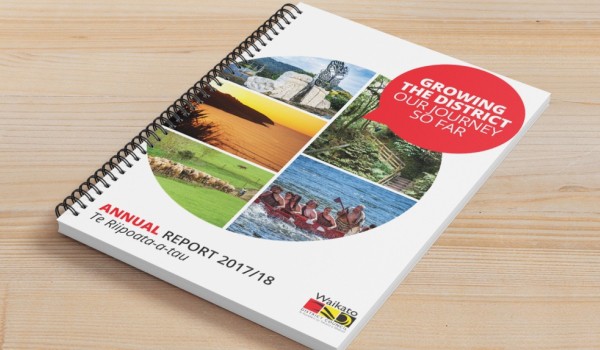Council focusses on future ‘liveability’ after a pivotal year
Waikato District Council is preparing for a long period of growth and change and has undertaken a series of major initiatives in the past year that will be pivotal to creating liveable communities for the future says Mayor Allan Sanson.
One of the fastest growing districts in the country, Waikato district is forecasting a 20% jump in property numbers (from 32,000 to 38,500) in the next decade, and population growth of more than 12,000 – close to the combined populations of our two largest towns, Ngaruawahia and Huntly.
In the Council’s Annual Report adopted today (8 October), Mayor Sanson highlighted the importance of the Council’s new vision of ‘liveable, thriving and connected communities’, saying it will “guide how we shape our growth so we create communities that people feel connected to and want to live in.”
 Laid out in the Long Term Plan, this vision is supported by a $1 million budget to implement a series of blueprints for the District’s key growth areas which will help inform work, in partnership with the Government, to maximise opportunities for integrated growth management along the Hamilton to Auckland corridor.
Laid out in the Long Term Plan, this vision is supported by a $1 million budget to implement a series of blueprints for the District’s key growth areas which will help inform work, in partnership with the Government, to maximise opportunities for integrated growth management along the Hamilton to Auckland corridor.
Among other major initiatives Mayor Allan says the Council has:
- Developed a proposed District Plan “to complement the new direction” with a new village zone and more opportunities for papakainga (multiple dwelling) development,
- Brought together key government agencies to support a business case for integrated growth management in North Waikato,
- Secured $38 million from the Government’s Housing Infrastructure Fund to facilitate development in Te Kauwhata over the next decade
- Found a way to save about $28.3 million on managing waters services in the next 10 years and completed a switch to water meter charging to encourage water conservation and help reduce water losses ,
- Delivered efficiencies in road asset management including a LED streetlight upgrade to improve lighting levels and save $70,000 a year,
- Continued a $1.76 million wastewater system upgrade programme to protect our waterways and environmentally sensitive areas
- Diverted 123 tonnes of food waste from landfill to compost by supporting a kerbside food waste collection in Raglan in partnership with Raglan’s Xtreme Zero Waste.
Waikato District Council met its financial targets for the past year, and worked to set rates and debt levels that balance affordability with the need to provide for a growing community, he says.
Average rates per rateable property were $2,792 for 2017/18 compared with a calculated affordability limit of $2,999. Average debt per rateable property is $2,557.
“This is 57 per cent below our debt servicing limit, offering capacity for funding services and facilities as needed for the future.”
Mayor Sanson says the Council is working to attract new business to the district in the interest of balanced growth and the provision of local employment opportunities, and the latest figures available showed the Waikato district attracted 183 new businesses and more than 500 new jobs in the year to March 2018. Major developments included decisions by Synlait Milk to invest $250 million in a nutritional milk powder factory in Pokeno opening in 2019-20, and by the Government to extend fast internet to a total of 17 of the district’s towns and mobile blackspot areas.
He says the Council is focussed on sustainable delivery of services and wants to involve the community in decisions affecting the future of the district. “We are proud that some of our most widely-used services recorded customer satisfaction levels of 80% or more including libraries (97%), parks and reserves (86%), wastewater (95%), water (83%), rubbish (80%), recycling (84%) and animal control (82%). Overall, 74% of survey respondents were satisfied with the way rates are spent on the services and facilities we provide.”
The Council also committed grants totalling more than $800,000 from Council-owned or administered funds for distribution to 174 organisations to enable communities to meet some of their own needs, says Mayor Sanson.
